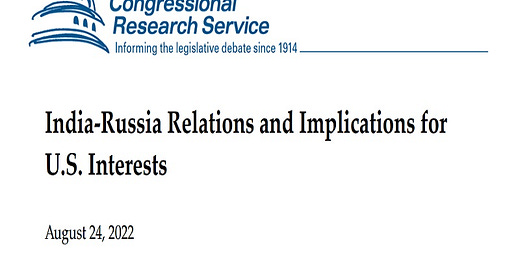The Congressional Research Service Suggests Continuing The Carrot-And-Stick Approach To India
This schizophrenic policy shows that the US still doesn’t respect India as the international equal that it is under international law but instead considers it to be a vassal-in-waiting that its policymakers are convinced will inevitably submit to their unipolar hegemony if they just continue pressuring it.
The influential Congressional Research Service (CRS) just published a lengthy report on “India-Russia Relations and Implications for U.S. Interests” authored by specialist in South Asian affairs K. Alan Kronstadt. This public institute advises policymakers, so its work should be taken very seriously by all observers. The Indian-US Strategic Partnership has recently come under strain as a result of America unsuccessfully attempting to pressure that South Asian state into condemning and sanctioning Russia, which Delhi proudly refuses to do due to its independent foreign policy and desire to maximize its strategic autonomy in the global systemic transition to multipolarity. It’s therefore of interest to see how the CRS suggests that its declining unipolar hegemonic patron respond to this policy failure.
Unsurprisingly, the gist of its proposals boils down to simply continuing the same tried, tested, and ultimately unsuccessful carrot-and-stick approach. Kronstadt advises congressional representatives to consider more robustly competing with Russia in arms sales, countenance the reinstatement of India in their country’s Generalized System of Preferences, continue trade and investment talks, and scale up foreign aid. At the same time, he also advises them to consider imposing secondary sanctions on India for its purchase of Russian arms, explore whether it’s worth them focusing more on its alleged human rights violations, and flirt with the possibility of withholding foreign aid as punishment.
This schizophrenic policy shows that the US still doesn’t respect India as the international equal that it is under international law but instead considers it to be a vassal-in-waiting that its policymakers are convinced will inevitably submit to their unipolar hegemony if they just continue pressuring it. The reality is that India is a self-confident, strategically autonomous, and rapidly rising multipolar Great Power that’s comprehensively shaping the global systemic transition. That civilization-state is doing so through its decisive intervention that preemptively averted Russia’s potentially disproportionate dependence on China, which also includes leading the global de-dollarization trend.
Instead of acknowledging the role that India’s dual-tripolarity grand strategy plays in preserving a semblance of balance and certainty amidst the chaotic processes that are accelerating in International Relations, which in turn enables all players to more confidently plan and implement their respective policies, the US is deliberately seeking to exacerbate that aforementioned chaos as part of its Machiavellian plot to weaponize such processes out of desperation to delay the decline of unipolarity. That explains why its policymakers continue to disrespect India as evidenced by the CRS clinging to its patron’s failed carrot-and-stick policy towards that Great Power.




